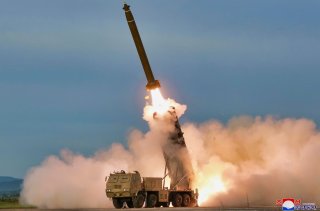North Korea's October Surprise: A Nuclear Weapons Test?
Some in the United States worry that North Korean leader Kim Jong-un could carry out an October surprise by doing a nuclear weapon test just before the U.S. presidential election this year. Could Kim do that? We don't know, but he certainly has a number of reasons for doing so.
Some in the United States worry that North Korean leader Kim Jong-un could carry out an October surprise by doing a nuclear weapon test just before the U.S. presidential election this year. Could Kim do that? We don't know, but he certainly has a number of reasons for doing so.
The North Korea Nuclear Test October Suprise
North Korea's last nuclear weapon test was in September 2017. Many have wondered why he has gone almost seven years without another such test. Undoubtedly China’s open opposition to North Korean nuclear weapon tests plays a major role in the North’s decision. The North knows that it must use nuclear weapon tests very sparingly or risk China’s wrath. Indeed, China has recently offended the North by agreeing with South Korea and Japan to seek North Korean denuclearization.
It is curious that when Kim introduced his “tactical nuclear weapon” design in March last year, he did not do a nuclear weapon test to confirm that design. But maybe those weapons were purely mock-ups, or maybe they were not yet the design Kim was seeking.
After all, Kim has announced plans to target airfields, ports, and military command and control facilities with tactical nuclear weapons. These are generally large, hardened facilities. Most would be partially damaged but not destroyed by 10 kiloton tactical nuclear weapons, like those that Kim might currently possess. Kim has probably been hoping to get a more advanced design for his tactical nuclear weapons that would produce an explosion of 100 kilotons or so.
Why Nuclear Weapons Testing Matters for North Korea
To put this into context, Kim has talked about a weapon that would fit on missiles like his KN-25 that has a 600 mm diameter. For comparison purposes, the U.S. Minuteman III warhead has a 541 mm diameter including the reentry shield on the warhead, and it has about a 350 kiloton yield. Kim is unlikely to get a warhead that powerful—the United States carried out hundreds and hundreds of nuclear weapon tests trying to master not only the science but also the art of making efficient nuclear weapons. But if Kim had a nuclear weapon with a 100 kiloton yield that would fit on his KN-25 and related missiles, that would allow him to do pretty serious damage to individual airfield, port, and military command control targets. Kim would likely consider such nuclear weapons as being tactical because he would plan to use them in the Korean theater and not because they have small nuclear weapon yields.
Kim has likely been waiting to have a more powerful nuclear weapon design before attempting one of the nuclear weapon tests he might be able to pull off without severe consequences. Could he have that design yet? Yes, especially if either the Russian government or rogue Russian scientists have helped in such a development. But we do not know.
The Timing of a Test for Kim Jong-un
October could be a good time for him to test such a weapon.
If Kim does, it would get him an extremely large amount of outside media attention at U.S. election time, allowing him to grab the spotlight from and embarrass President Biden, who Kim likely feels has largely ignored him. As that outside information leaks into the North, Kim could use it to bolster his claim to senior elites that he is recognized in the world as an important leader.
Kim is also likely anxious to affect the results of the U.S. Presidential election. Kim knows that President Biden is unwilling to compromise with the North. But Kim may hope that Trump would be willing to compromise, as he did in the Singapore Summit. Kim may even hope that after a significant 7th nuclear weapon test, Kim’s dream of North Korea being recognized as a nuclear weapon state could be realized.
About the Author: Dr. Bruce W. Bennett
Bruce W. Bennett is a senior international/defense researcher at RAND, a nonprofit, nonpartisan research institution. He works primarily on research topics such as strategy, force planning, and counterproliferation within the RAND International Security and Defense Policy Center. You can follow him on Twitter: @bwbennett.


